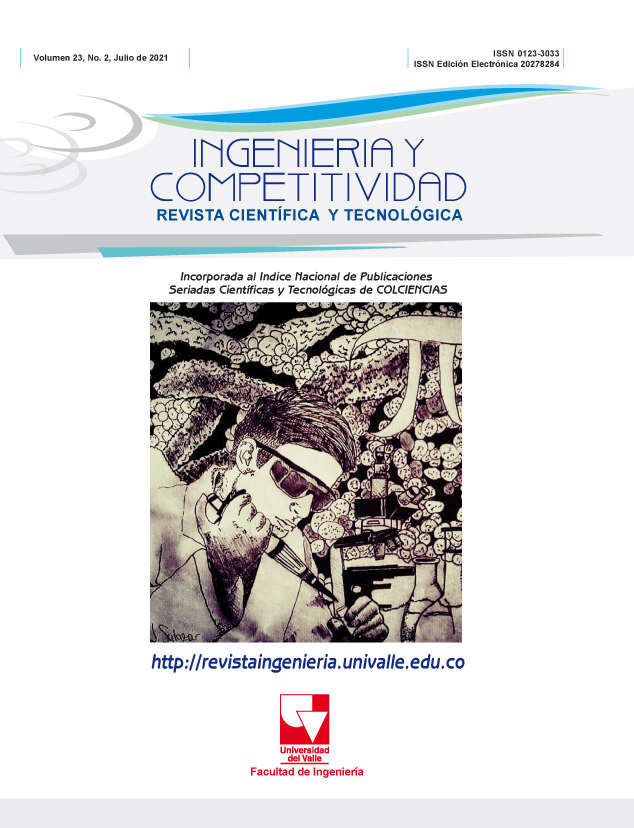Programación de itinerarios con deterioro de máquinas en flujo
Palabras clave:
Mantenimiento, Programación de la producción, Sistemas de Secuencias, Tardanza, Tiempo máximo de operaciónContenido principal del artículo
Este articulo aborda el problema permutation flowshop con deterioro. Los objetivos son minimizar el tiempo máximo de operación y la tardanza. Los trabajos tienen un tiempo de proceso base en cada máquina y tienen una fecha de vencimiento. El tiempo real de proceso depende del nivel de rendimiento de la máquina al inicio de cada trabajo, que es una función de los trabajos procesados previamente y su efecto de desgaste/deterioro en la máquina. El articulo presenta múltiples heurísticas y un conjunto exhaustivo de experimentos. Los resultados indican que, como grupo, las heurísticas generan soluciones que están muy cerca de lo óptimo para ambos criterios. Además, ningún enfoque heurístico es dominante para todas las condiciones experimentales, por lo que la selección heurística para resolver problemas prácticos debe basarse en las características específicas del problema.
(1) Fei H, Li Q, Sun D. A survey of recent research on optimization models and algorithms for operations management from the process view. Scientific Programming. 2017. https://doi.org/10.1155/2017/7219656.
(2) Long J, Zheng Z, Gao X, Pardalos PM. Scheduling a realistic hybrid flow shop with stage skipping and adjustable processing time in steel plants. Applied Soft Computing. 2018;64:536-549. https://doi.org/10.1016/j.asoc.2017.12.044
(3) Khare A, Agrawal S. Scheduling hybrid flowshop with sequence-dependent setup times and due windows to minimize total weighted earliness and tardiness. Computers & Industrial Engineering. 2019;135:780-792. https://doi.org/10.1016/j.cie.2019.06.057
(4) Pan QK, Ruiz R, Alfaro-Fernández P. Iterated search methods for earliness and tardiness minimization in hybrid flowshops with due windows. Computers & Operations Research. 2017;80:50-60. https://doi.org/10.1016/j.cor.2016.11.022
(5) Reisman A, Kumar A, Motwani J. Flowshop scheduling/sequencing research: A statistical review of the literature, 1952-1994. IEEE transactions on Engineering Management. 1994;44(3):316-329. https://doi.org/10.1109/17.618173.
(6) Tohmé F, Frutos M. The non-permutation flow-shop scheduling problem: a literature review. Omega. 2018;77:143-153. https://doi.org/10.1016/j.omega.2017.05.010.
(7) Neufeld JS, Gupta JN, Buscher U. A comprehensive review of flowshop group scheduling literature. Computers & Operations Research. 2016;70:56-74. https://doi.org/10.1016/j.cor.2015.12.006.
(8) Kononov A, Gawiejnowicz S. NP-hard cases in scheduling deteriorating jobs on dedicated machines. Journal of the Operational Research Society. 2001;52(6): 708–717. https://doi.org/10.1057/palgrave.jors.2601117.
(9) Wang, JB, Xia ZQ. Flow shop scheduling problems with deteriorating jobs under dominating machines. Journal of the Operational Research Society. 2006;57(2): 220–226. https://doi.org/10.1057/palgrave.jors.2601959.
(10) Wang JB, Ng CTD, Cheng TCE, Liu LL. Minimizing total completion time in a two-machine flow shop with deteriorating jobs. Applied Mathematics and Computation. 2006;180(1):185–193. https://doi.org/10.1016/j.amc.2005.11.162
(11) Lee WC, Wu CC, Wen CC, Chung YH. A two-machine flowshop makespan scheduling problem with deteriorating jobs. Computers & Industrial Engineering. 2008;54(4):737-749. https://doi.org/10.1016/j.cie.2007.10.010.
(12) Lee WC, Shiau YR, Chen SK, Wu CC. A two-machine flowshop scheduling problem with deteriorating jobs and blocking. International Journal of Production Economics. 2010;124(1), 188-197. https://doi.org/10.1016/j.ijpe.2009.11.001
(13) Wang JB, Ji P, Cheng TCE, Wang D. Minimizing makespan in a two-machine flow shop with effects of deterioration and learning. Optimization letters. 2012;6(7): 1393-1409. https://doi.org/10.1007/s11590-011-0334-y.
(14) Wang JB, Wang MZ. Minimizing makespan in three-machine flow shops with deteriorating jobs. Computers & Operations Research. 2013;40(2):547-557. https://doi.org/10.1016/j.cor.2012.08.006
(15) Sun LH, Ge CC, Zhang W, Wang JB, Lu YY. Permutation flowshop scheduling with simple linear deterioration. Engineering Optimization. 2018;51(8):1281-1300. https://doi.org/10.1080/0305215X.2018.1519558.
(16) Bank M, Ghomi SF, Jolai F, Behnamian J. Two-machine flow shop total tardiness scheduling problem with deteriorating jobs. Applied Mathematical Modelling. 2013;36(11):5418-26. https://doi.org/10.1016/j.apm.2011.12.010
(17) Lee WC, Yeh WC, Chung YH. Total tardiness minimization in permutation flowshop with deterioration consideration. Applied Mathematical Modelling. 2014;38(13):3081-3092. https://doi.org/10.1016/j.apm.2013.11.031
(18) Sánchez-Herrera S, Montoya-Torres JR, Solano-Charris EL. Flow shop scheduling problem with position-dependent processing times. Computers & Operations Research. 2019;111:325-345. https://doi.org/10.1016/j.cor.2019.06.015
(19) Ruiz-Torres AJ, Paletta G, Pérez E. Parallel machine scheduling to minimize the makespan with sequence dependent deteriorating effects. Computers & Operations Research. 2013;40(8):2051-61. https://doi.org/10.1016/j.cor.2013.02.018
(20) Santos VLA, Arroyo JEC. Iterated greedy with random variable neighborhood descent for scheduling jobs on parallel machines with deterioration effect. Electronic Notes in Discrete Mathematics. 2017;58:55-62. https://doi.org/10.1016/j.endm.2017.03.008
(21) De Araújo O, Dhein G, Fampa M. Minimizing the makespan on parallel machines with sequence dependent deteriorating effects. In: XLIX Simpósio Brasileiro de Pesquisa Operacional. Blumenau-SC: SOBRAPO – Sociedade Brasileira Pesquisa Operacional; 2017. p. 3556–67.
(22) Pérez E, Ambati RR, Ruiz-Torres AJ. Maximising the number of on-time jobs on parallel servers with sequence dependent deteriorating processing times and periodic maintenance. International Journal of Operational Research. 2018;32(3):267-289.
(23) Ding J, Shen L, Lü Z, Peng B. Parallel machine scheduling with completion-time-based criteria and sequence-dependent deterioration. Computers & Operations Research. 2019;103:35-45. https://doi.org/10.1016/j.cor.2018.10.016
(24) Khamadaliyev DM, Ulyanov VN. Ulyanov DO, Taylakov KS, Serdyuk RZ. et al. A Software Solution for Automatic Optimization of Logistics During Well Drilling and Flowback Operations. Russian Oil and Gas Technologies Magazine. 55:104-111. https://rogtecmagazine.com/rogtec-issue-55/.
(25) Johnson SM. Optimal two- and three-stage production schedules with setup times included. Naval Research Logistics Quarterly. 1954;1(1):61-68.https://doi.org/10.1002/nav.3800010110
Downloads

Esta obra está bajo una licencia internacional Creative Commons Atribución-NoComercial-CompartirIgual 4.0.
Los autores que publican en esta revista están de acuerdo con los siguientes términos:
Los autores ceden los derechos patrimoniales a la revista y a la Universidad del Valle sobre los manuscritos aceptados, pero podrán hacer los reusos que consideren pertinentes por motivos profesionales, educativos, académicos o científicos, de acuerdo con los términos de la licencia que otorga la revista a todos sus artículos.
Los artículos serán publicados bajo la licencia Creative Commons 4.0 BY-NC-SA (de atribución, no comercial, sin obras derivadas).

